|
Printables |
PowerPoints |
Online exercises |
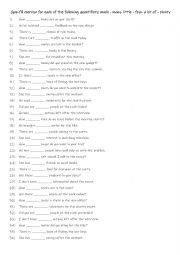
|
A2-B1 Practise with the following quantifiers: much - many- little - few- a lot of � plenty
Students familiarise themselves with the use of the 6 quantifiers. Then they read the sentences to see which quantifier is needed to complete the sentence.Each quantifier is used 6 times. Answers on page 2.
Level: elementary
Age: 8-100
Type: worksheet
Downloads: 110
|
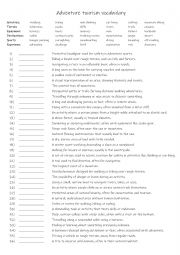
|
A2+-B1 Adventure tourism vocabulary
First, students need to familiarise themselves with the 25 words and their meanings Then they read the definitions to see which one is being described and write that word in the space provided. Answers on page 2.
Level: intermediate
Age: 10-100
Type:
Downloads: 125
|
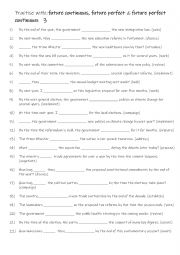
|
B1-B2 Practise with future continuous, future perfect & future perfect continuous 3
Students should learn the future continuous, future perfect, and future perfect continuous tenses to express a variety of future actions and events more clearly. The future continuous describes ongoing actions at a specific future time, the future perfect indicates actions that will be completed before a certain future point, and the future perfect...
Level: intermediate
Age: 10-100
Type: worksheet
Downloads: 135
|
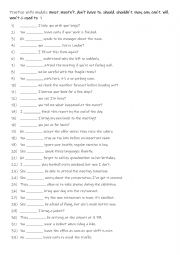
|
A1+-A2 Practise with modals must, mustn�t, don�t have to, should, shouldn�t, may, can, can�t, will, won�t & used to 1
Practising modals like must, should, can, and used to is essential for students as it enhances their ability to express necessity, advice, permission, and past habits. This not only improves their grammar and sentence construction but also builds confidence in real-life communication, whether giving instructions, making requests, or discussing poss...
Level: elementary
Age: 9-100
Type:
Downloads: 102
|
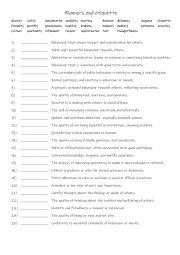
|
B1+-C1 25 nouns for manners and etiquette 1
Students should learn vocabulary related to manners and etiquette because these concepts are essential for building strong interpersonal relationships and navigating social situations with respect and confidence. These terms help students understand cultural expectations, making communication smoother and more effective in diverse environments. A...
Level: intermediate
Age: 10-100
Type:
Downloads: 111
|
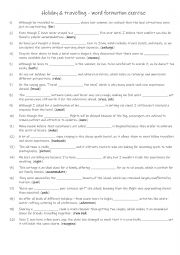
|
B1 Holiday & travelling - word formation exercise
Understanding word formation allows students to expand their vocabulary, enabling them to express themselves more precisely and creatively. Knowing how to manipulate words helps them create varied sentence structures, making their writing more engaging and dynamic.Mastering word formation is key to achieving higher levels of language proficiency, p...
Level: intermediate
Age: 9-100
Type:
Downloads: 103
|
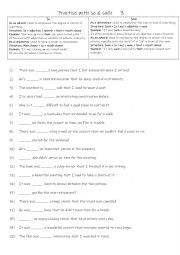
|
A2+-B1 Practise with so & such 3
First, students need to familiarise themselves with the 2 words. Then they read the sentences to work out which one is needed to complete the gap-fill. Each word is used 10 times! Answers on page 2
Level: elementary
Age: 9-100
Type:
Downloads: 110
|
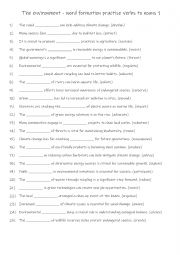
|
B1-B2 The environment - word formation practise verbs to nouns 1
Learning word formation, especially transforming verbs into nouns, is important for expanding vocabulary, improving communication, and expressing ideas more clearly, particularly in discussions about the environment. It allows for more precise and varied language, helping you describe both actions and their outcomes (e.g., "recycle" to "recycling")...
Level: intermediate
Age: 9-100
Type:
Downloads: 103
|
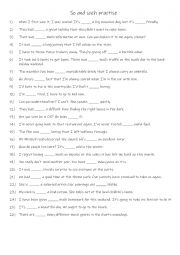
|
A2-B1 Intensifiers: so and such practise
Learning how to use "so" and "such" is important because they help students emphasise their statements and make their speech and writing more precise and expressive.Mastering "so" and "such" instead of relying on words like "very" and "really" adds variety to language, making it more dynamic and interesting. First students familiarise themselves wi...
Level: intermediate
Age: 8-100
Type:
Downloads: 130
|
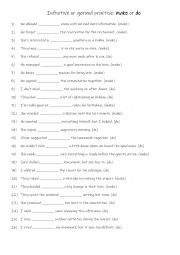
|
A2-B1 Gerund or infinitive practise
Students read the sentences to see if a gerund or an infinitive is required to complete the sentences. Answers on page 2.
Level: intermediate
Age: 9-100
Type:
Downloads: 114
|
|
|
|
|












